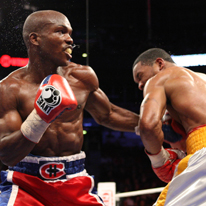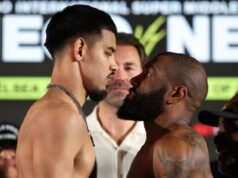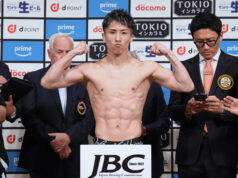
Much has been made about poor ticket sales for Timothy “Desert Storm” Bradley versus Devon Alexander “The Great.” The venue, Silverdome – originally so named because of the glare off its white fiberglass roof – has been criticized. Along with its undefeated fighters. Along with the black community to which Bradley-Alexander should appeal on Jan. 29.
Is such criticism just? Perhaps. But if we’re going to make a fetish of removing prizefights from casino settings and putting them in spots with local interest, we owe it to “The Super Fight” and our sport to suspend judgment and attend the event.
I’ll be there even though getting there is a logistical mess. The fight is not in Detroit. It is in Pontiac, Mich., 35 miles due north.
That means renting a car at the airport. And no, there aren’t many direct flights from South Texas to DTW. There will also be the questions of where the hell the press conference and weigh-in happen. All that, of course, is before you consider the lunacy of traveling from 60-degree days to a spot between Lakes Erie and Huron, in January.
But I want to see Detroit. I want to see if it could possibly be as Charlie LeDuff described it a few months ago in Mother Jones.
“Today—75 years after the beavers disappeared from the Detroit River—‘Detroitism’ means something completely different,” wrote LeDuff. “It means uncertainty and abandonment and psychopathology.”
Psychopathology. In an American city? We like to think such things are kept below the border in abattoirs like Ciudad Juarez.
As always, then, this boxing trip is an excuse to see a city with fresh eyes. Preliminary emails with young locals provide some happy possibilities. They say Detroit is in the midst of a rebirth. It’s not even 40 miles from Ann Arbor, after all, and so many University of Michigan undergrads set loose on an urban center that is “rewilding” – having places abandoned so long they return to their natural state – might just give the place a social consciousness, along with a conscience.
Well, why not? When they graduate, those kids aren’t finding jobs anyway.
But I’m also going to “The Super Fight” to support two undefeated titlists and make a challenge to the community that shaped them.
Timothy Bradley is the favorite among knowledgeable boxing folks – people who actually skip rope and hit heavy bags and know how easily hand-speed can be neutralized when it’s set atop a shaky foundation. Bradley’s style is a relentless one. He is a volume guy, the most exciting kind of fighter. And his matchmaking approach has undergone a recent and refreshing revision.
The year 2010 was about staying undefeated, he said last week on a promotional conference call. This year, conversely, is about making the best fights.
“My biggest goal in boxing is just to be remembered,” Bradley said. “I don’t want to be forgotten about.”
You hear that? It’s the sound of a smart young fighter reviewing the “Money May” bio and deciding it’s a cautionary tale, not an epic. The Bradley-Alexander conference call in some ways felt as though it were marking a reevaluation of Floyd Mayweather’s self-indulgent template. Like a realization that Mayweather’s money will be gone soon enough, but may still outlive his legacy.
A number of folks are now able to see the day when a 30 for 30-type documentary will be made about “The Greatest Fight that Never Was.” On the A-side will be President of the Philippines Many Pacquiao addressing a roiling crowd of one million countrymen. On the B-side, meanwhile, Mayweather will be in a poorly lit gym, working the hand pads with a Golden Gloves runner-up and saying, “Everyone knows I’d a beat ‘Pooch-iao’.”
Devon Alexander does not have Bradley’s loquaciousness, but he has a quiet confidence that is appealing. And he has something else Bradley does not seem to have yet: An ability to sell tickets. Some of that is his promoter. Even in a grieving state, Don King is a master ticket-seller. But some of that, too, is Alexander’s admirable calmness.
Until last week’s call, I’d not given him much of a chance against Bradley. He looked most vulnerable in August against Andriy Kotelnik. His trainer is a loud motivator who seems never to have noticed how alarmingly his charge’s guard strays while jabbing.
But something about Alexander’s demeanor made me rethink things. He was happy to let Bradley play emcee. He knew Bradley was better at talking, and so he let him talk. He seemed eerily comfortable in his role, offering little more than variations on a “now is my time” theme. Alexander might just have the perfect temperament to foil a Desert Storm.
Which leaves us with a challenge of sorts for the black community that shaped Bradley and Alexander. On last week’s conference call, both men slipped a question about what their match – two undefeated African-Americans fighting just north of a city that is 83 percent black – might mean to their community. Bradley said it was a great fight for Americans, not just African-Americans. Alexander said it was a throwback event.
“This is a fight like the old days,” he said. “The greats wanted to fight the best.”
Why would they slip such a question? Maybe because they’re afraid their people won’t show up. Boxing insiders use words like “invisible” when describing the black community and live gates; they may rally round a pay-per-view event every few years, but don’t expect them to fill an arena.
Well, this is a chance to surprise some folks – like they do at Alexander’s fights in St. Louis. This is a chance for Don King to work a crowd as only he knows how. This is a chance to roar a bit and prove to the country Detroit has more to offer than psychopathology.
A few of us will be there to report it, do believe. As it is. However it turns out.
Bart Barry can be reached at bbarry@15rounds.com.









